To many Belarusians, both political analysts and ordinary citizens, Belarus’ August 9, 2020 presidential elections never entirely ended. Numerous alleged falsifications, police violence toward peaceful protesters, arbitrary prosecutions of independent media and dissenters have plunged Belarus into a deep political crisis.
The country now contains more than 600 political prisoners according to the Belarusian human rights organization Viasna (Spring), which itself has been raided by police. Thousands have left the country or been detained or arrested.
Few questioned that Alyaksandr Lukashenka, in power since 1994, would put up a fight in 2020 to retain the presidency, which he still insists he won fairly. But few of his contenders likely would have predicted that the struggle with Belarus’ heretofore weak opposition would intensify to such a degree.
The four registered candidates who opposed Lukashenka in the 2020 polls have all filed complaints with the Supreme Court about the election results, but none of the three have participated actively in the protest movement headed by former candidate Svyatlana Tsikhanouskaya.
Syarhey Cherachan, 36: More Campaigning To Come
Official Election Result: 1.1 % of the vote (Just over 66,000 votes)
The chairman of the Belarusian Social Democratic Party Gramada, Cherachan, an investment consulting entrepreneur, said in 2020 that he was running for president “for the experience.”
Doubts persist, however, about which side – government or opposition – will benefit from that experience.
At the end of October 2020, after Lukashenka’s de facto presidential inauguration, Cherachan met with one of the strongman’s circle, Natalya Kochanova, chairwoman of the upper house of parliament, “to discuss the constitution.” The meeting sparked a wave of criticism of Cherachan for allegedly playing along with one of Lukashenka’s Moscow-backed, pet projects, constitutional reform.
But in a video message to mark the August 9, 2021 anniversary of the protests, Cherachan stressed, however, that Belarusians had learned to help each other during the past year of protests, “Society has grown up,” he informed viewers.
Pledging to work “for the sake of all of us, for the sake of our motherland, for the sake of the future,” Cherachan intends to carry on with politics. He announced in May 2021 that he’s assembling a team to take part in Belarus’ 2022 local elections.
In the meantime, he’s active on social media and regularly vlogs on YouTube.
Andrey Dzmitryeu: Party Power, Post-Lukashenka
Official Election Result: 1.2% of the vote (Just over 70,000 votes)
Immediately after the August 9, 2020 elections, Andrey Dzmitryeu, the co-chairman of Belarus’ Tell the Truth movement, announced his support for Tsikhanouskaya and demanded a vote recount.
Despite the risks of such public declarations, he has remained in Belarus.
But he has not escaped scrutiny. On July 14, 2021, the Belarusian Justice Ministry demanded documents from Tell the Truth for “verification.” The following day, the organization’s Minsk office was searched, but for what purpose remains unclear. The office has since been sealed shut.
These measures coincided with investigations of other non-governmental organizations, following the detention of independent reporters, including for RFE/RL’s Belarusian Service. (Current Time is run by RFE/RL in association with the Voice of America.)
In a March 2021 interview with RFE/RL’s Belarusian Service, Dzmitryeu had stressed the need to form well-organized and financed political parties to prepare Belarusian society for when “Lukashenka won’t be here,” but “the system” will remain. Taking to the streets, he said, is no longer enough to unite likeminded Belarusians.
Active on social media, Dzmitryeu regularly streams YouTube commentaries in which he discusses current events in Belarus and promotes “our party,” defined as a “union of concerned Belarusians who make the life around them better and stand up for the truth.”
Hanna Kanapatskaya, 44: Promising 'Constructive Opposition’
Official Election Result: 1.7% of the vote (Around 98,000 votes)
Lawyer and former parliamentarian Hanna Kanapatskaya entered the 2020 race calling Lukashenka and herself the only “serious politicians.” One year later, that opinion does not appear to have changed.
After the elections, Kanapatskaya announced plans to create a National Democratic Party. On social media, she was referred to as the leader of the Public Center of Legislative Initiatives. But nothing about either the planned party or the center is known.
In the past, critics have taken aim at Kanapatskaya, the daughter of Belarus’ “first dollar millionaire,” bread-factory and poultry-farm owner Anatoly Trukhanovich, for allegedly straddling the fence between the government and opposition.
This February, she was invited to the All-Belarusian People’s Assembly, viewed by the opposition as an event reminiscent of the Soviet Communist Party’s quinquennial congresses. Alyaksandr Lukashenka presided over the gathering, which he touted as “one of the most important forms of democracy.”
On social media, Kanapatskaya justified her presence by saying she was representing the interests “of all of Belarus’ constructive opposition.” She was allowed to make a speech, but state TV channels ended its live feed once she began to speak about the division between Belarus’ government supporters and opponents.
Based on a copy of the speech published on her Instagram account, Kanopatskaya asked the government not to label as “extremist” Belarus’ former red-and-white flag, a symbol of the protest movement, and urged them to “change the measures” for investigating those who participated in 2020’s unauthorized protests against the presidential election results.
Never known for her warmth toward her 2020 opposition rivals, Kanapatskaya has taken sharp aim at Svyatlana Tsikhanouskaya since the vote.
Before the latter’s July 2021 trip to the U.S., the lawyer described her on Facebook as “an imposter” and “an element of the hybrid Anschluss,” a potential reference to EU and U.S. pressure for reform in Belarus.
Currently, nothing is known about Kanopatskaya's own political activities.
Svyatlana Tsikhanouskaya, 38: ‘For The Right Of Choice’
Official Election Result: 10.1% of the vote (Nearly 588,620 votes)
The past year has seen Svyatlana Tsikhanouskaya go from a homemaker with no political experience to the leader of Belarus’ democratic opposition. To many Belarusians, she is, in fact, the actual elected president of Belarus.
Tsikhanouskaya, a former English translator, has actively forged ties with the European Union and United States, addressed the United Nations Security Council, and lobbied for ongoing sanctions against the Belarusian government. She also helped form a Coordination Council to streamline the Belarusian opposition's response to what it charges was a falsified election.
But though she has called for fresh presidential elections, she insists that she herself will not take part.
Family still appears to come first for Tsikhanouskaya. She entered the presidential race on behalf of her husband, jailed blogger Syarhey Tsikhanouski, who was denied registration. He is currently on trial in a closed courtroom for supposedly inciting hatred and setting up mass disturbances, charges that carry a potential 15-year prison term.
Tsikhanouskaya suddenly left Belarus for Vilnius, Lithuania on August 10-11, 2020 after what she later indicated were threats against her children.
She maintains that her ongoing activism has nothing to do with building a political career. “I am simply doing my duty” – fighting “for the right of choice,” she said after meeting with U.S. President Joe Biden on July 28.
Unregistered Candidates:
Viktar Babaryka, 57
Banker and philanthropist Viktar Babaryka, the former head of Russian energy giant Gazprom’s Belarusian bank, was sentenced to 14 years in prison on July 6, 2021 on charges of tax dodging and bribery.
These charges, filed against him shortly after he announced his intentions to run for president, earlier served as the official reason why he was denied registration as a 2020 presidential candidate. He has been behind bars since June 18, 2020.
His former campaign head, 39-year-old Maryya Kalesnikava, a prominent ally of Tsikhanouskaya, has been incarcerated since September 2020. Now on trial, she faces up to 12 years in prison on charges of conspiring to overthrow the government, posing a national security threat, and overseeing an extremist group.
Valer Tsapkala, 56
Fearing arrest, Valer Tsapkala, a former presidential scientific aide and founder of Minsk’s High-Tech Park, fled Belarus to Russia a few weeks before the August 9, 2020 presidential vote. The Central Election Commission recognized less than half – 75,000 – of the signatures he had collected to register his candidacy for the 2020 presidential race; far below the 100,000 signatures needed.
Tsapkala’s wife, Veranika Tsapkala, however, became another prominent supporter of Tsikhanouskaya, completing a trio who brought women to the forefront of Belarusian electoral politics. Also fearing a politically motivated arrest after questioning, she left Belarus on the eve of its 2020 presidential elections.
The Tsapkalas moved to Latvia, the site of a growing community of self-exiled Belarusians, in late 2020. The couple have created a foundation there to help Belarusian women suffering from the government’s actions. The Tsapkalas also help refugees from Belarus who have received political asylum in Latvia, a member of the EU.




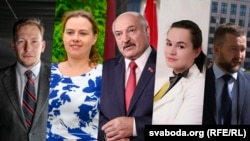

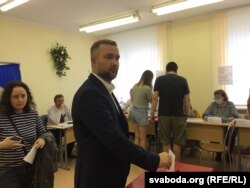

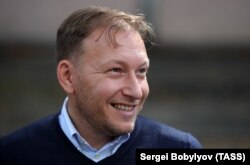

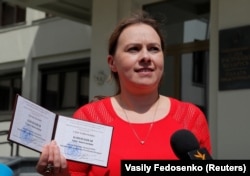

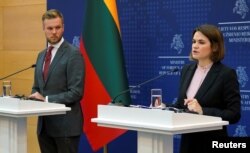




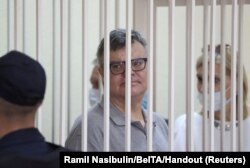



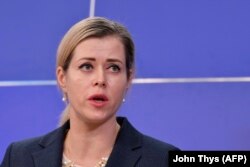

Facebook Forum